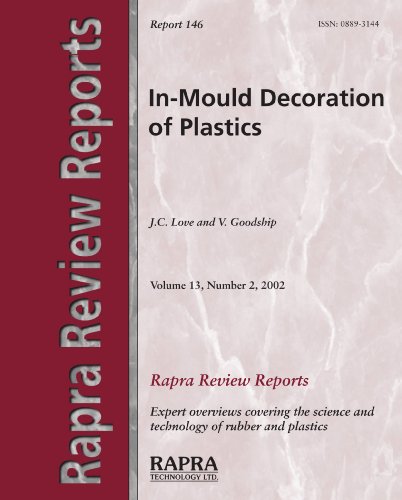

Most ebook files are in PDF format, so you can easily read them using various software such as Foxit Reader or directly on the Google Chrome browser.
Some ebook files are released by publishers in other formats such as .awz, .mobi, .epub, .fb2, etc. You may need to install specific software to read these formats on mobile/PC, such as Calibre.
Please read the tutorial at this link: https://ebookbell.com/faq
We offer FREE conversion to the popular formats you request; however, this may take some time. Therefore, right after payment, please email us, and we will try to provide the service as quickly as possible.
For some exceptional file formats or broken links (if any), please refrain from opening any disputes. Instead, email us first, and we will try to assist within a maximum of 6 hours.
EbookBell Team

4.1
70 reviews
ISBN 10: 1859573282
ISBN 13: 978-1859573280
Author: Love, Goodship
Many plastic components need to have a surface finish applied before use. This can act as a decorative layer, a protective layer, to smooth out surface defects, or to alter surface properties (for example, to enhance adhesion). If this surface effect is applied during the moulding process, it can reduce time, space, material and machinery requirements. It also allows processors to supply complete systems, rather than just moulded components. In-mould decoration techniques include the in-mould application of film, in-mould priming, in-mould labelling and the injection of paints into the mould. In-mould decoration generally requires additional equipment, which can be expensive. Design is also critical for success. These factors need to be taken into consideration in corporate planning. In-mould films are prepared by multi-layer extrusion or solvent casting. They can be single colour or highly patterned with detailed graphics. They are stretched across a mould prior to injection, compression or blow moulding to produce a variety of decorative effects. customer personalisation of products such as cars and mobile phones. Changing design between moulds is as simple as changing a roll of film. Film preparation is also discussed in this review. Coatings comprising thermoplastic, pseudo-thermoplastic and uncured thermosetting materials can be injected or extruded into a mould. Here they act as paints in compression injection moulding and co-injection moulding. An additional benefit is that in-mould painting can reduce the release of volatile organic compounds (VOCs) into the atmosphere, which is a common problem in paint shops. In-mould labelling can eliminate the requirement for adhesive. In the first example of this practice, paper labels for ice cream container lids were inserted into the mould prior to injection. Labels can also be applied as film and made from the same plastic material as the component to facilitate bonding and create a continuous surface effect, i.e., the label becomes an integral part of the product. These techniques have widespread use in the plastics industry and the marketplace is expanding. areas for growth. Many new developments are taking place in this field. The indexed summaries of papers from the polymer library that are included with this review include a number of key patents. This reference section also provides a good indicator of the key companies involved in this area and the current applications of this technology. The emphasis of this review is on practical applications of the techniques of in-mould decoration including advantages and disadvantages. This book provides an excellent source of information about a developing area of moulding, which will allow processors to add value to products and compete in the marketplace.
Chapter1 : Introduction
Chapter 2: Content
Chapter 3: Conclusion
Chapter 4: Appendices
Chapter 5: Glossary
Chapter 6: References
Chapter 7: Index
in mold decoration injection molding
in-mold decoration examples
biodegradable plastic for injection molding
plastic and mold
common plastics for injection molding
Tags: Love, Goodship, Decoration of Plastics